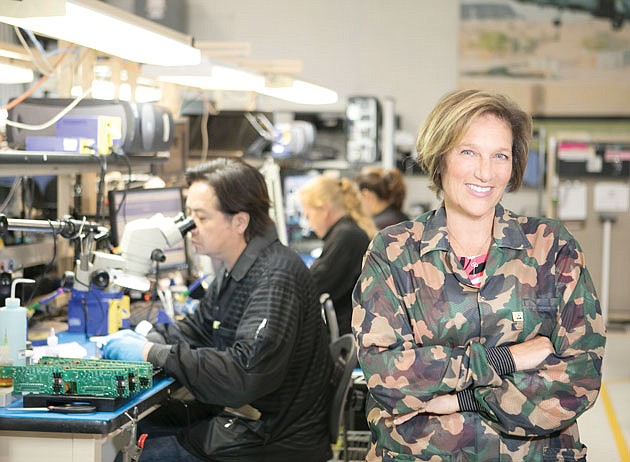- April 3, 2025
-
-
Loading

Sue Englander is a calculated risk taker. It's why the former sales manager for electronics distribution organizations decided to start her own business in 1993. “I wanted to be more in control of my destiny,” Englander says. Contrary to popular opinion, Englander wanted to start her own company so she could have more time with her family.
But she didn't jump in to entrepreneurship until she was certain that she'd be successful. She went out to her existing contacts in the defense and aerospace industry and asked, “If I go out on my own, would you give me a chance?” The prep work enabled her to be profitable from day one, providing electronics distribution support to her first customers. EEI Manufacturing Services was just two employees in a 300-square-foot office to start.
Twenty-four years later, with Englander as president, EEI Manufacturing Services has grown to a full-fledged manufacturing, engineering and training company with 42 employees in a 25,000-square-foot facility. The Clearwater-based company sells products and services exclusively to the aerospace, defense and homeland security industries. Englander says the products are all “life critical, flight critical ... they have to be 100%. Someone's life depends on it.”
The real story of growth has occurred over the past few of years, with EEI securing a spot with the Department of Defense's Mentor-Protege Program in September 2015, partnering with the Navy and Raytheon Co. In the year and a half since starting the program, the company has grown from 27 employees to 42. It has also experienced 20% revenue growth year over year.
The program includes three years of funding and two additional years of mentorship from a prime contractor — in EEI's case, Raytheon.
It wasn't an easy feat. The program required a three-year vetting process to make sure EEI's finances were strong. Raytheon was aligned to transfer technology to EEI and all parties agreed it would be a good relationship.
The program is helping EEO overcome its biggest challenge — visibility and credibility in an industry dominated by big contractors. “You need advocacy. You can get lost as a small company.”
Large government contractors are always looking for reliable small businesses that are a low risk to partner with. As a woman-owned small business, a small disadvantaged business, and an economically disadvantaged woman-owned small business, EEI fits the bill that big companies need to find to be awarded contracts with the government. Keeping a focus on specific target business and not going after commercial applications has been the best business decision she's made, Englander says.
EEI's customers include Orbital ATK, General Dynamics Corp., Boeing, L3 Technologies Inc., Lockheed Martin Corp., Bell Helicopter Textron Inc., Leonardo DRS Inc., GE Avionics and Honeywell International Inc. “You can advertise all you want,” Englander says, but at the end of the day, all the companies care about is performance on high-level programs. “Word spreads really quickly on time, affordability and quality.”
The company has also impressed people by how clean the factory is, the amount of investment it has put into technology and the engagement of its employees. The culture of the company is, “God first, family second, EEI will take whatever is left,” Englander says.
To maintain a Class-3 production environment, EEI invests between $6,000 and $8,000 per employee in certifications every two years, Englander says. Because training is so expensive, Englander decided to expand the company to become a licensed IPC training center in 2009. At the time, the company was one of 33 centers in the country. Now the company's revenue is split about 60% in manufacturing, 25% in engineering work and 15% in training other companies.
The move further solidified EEI's focus and expertise in aerospace, defense and homeland security, Englander says. Now the company is going for the AS-9100 certification, an aerospace standard that requires a huge investment. “It's not a game changer yet,” Englander says, though she sees it sporadically in contracts. Her best guess is that eventually it will replace the ISO certification standards, she says.